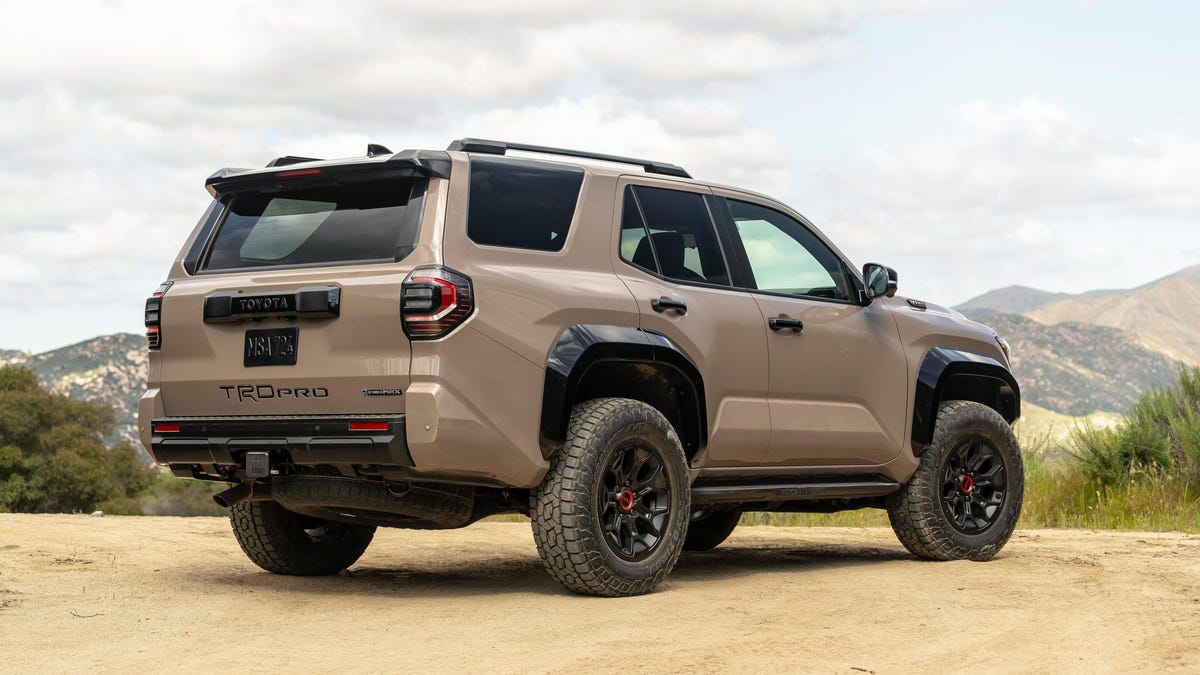Survey Labels Automotive Sector As ‘Most Disrupted’ Industry In The World
A recent study from Alix Partners has claimed that the automotive sector is the most "disrupted" business sector going into 2025, based upon executive sentiment. However, this is allegedly not a terrible thing because the report likewise suggests that automakers are among those best suited to adapt to changing business models.


A recent study from Alix Partners has claimed that the automotive sector is the most "disrupted" business sector going into 2025, based upon executive sentiment. However, this is allegedly not a terrible thing because the report likewise suggests that automakers are among those best suited to adapt to changing business models.
The study is quite broad and largely reliant upon executive surveys for its data. Alix Partners reached out to 3,200 executives — 1,000 of which were based in North America and 320 of which stemmed from the auto industry — to create the report. But it serves as a strong example of how market analysts and corporate leaders currently view the economy.
For the automotive industry, the report notes that many markets are in a period of high volatility. The reasons given for this are the slowing growth of electric vehicle sales (following massive spending and government subsidization), global competition from China, assumed geopolitical tensions, and presumed challenges in terms of balancing material production against novel business models.
Executives are also still concerned about the supply of semiconductor chips. While the shortage that peaked in 2022 has abated, automakers remained concerned that they’ll be able to source enough if trade tensions worsen. This is particularly relevant because modern vehicles are much more dependent upon those chips than past models. Additionally, 55 percent of surveyed executives claimed that the issue had already worsened in recent months.
Other concerns coming from industry management include high interest rates, ongoing inflation, taxation/tariffs, government regulation and pricing. But Alix claimed that this hadn’t been a detriment for all companies, with 27 percent of executives reporting profits rising by more than 10 percent — a seven percent increase from last year. Worker productivity was also said to be up significantly.
It’s an interesting study and underscores how the executive class views things. However, as someone who previously worked in market research and business consulting, there is likewise a lot of fluff in these kinds of reports to help drum up new business. You never want to paint a picture that looks too bleak and are typically instructed by your superiors to spin something as a positive whenever possible.
We also just spent the last two decades hearing corporate executives discussing disruption as a positive element. By 2016, numerous automotive CEOs were trying to frame legacy automakers as “industry disruptors” because the media and market analysts had previously used the term to describe any burgeoning company that was using a new business model to outperform the old guard. Netflix, Apple, and AirBnB have all been called disruptors in the past.
In the automotive realm, we heard it applied to Uber and Tesla before migrating to EV startups. But it was hardly limited to them. Companies working in robotics, artificial intelligence, or any other field deemed to be on the cutting edge of human technology, were similarly bestowed with the title. Before long, we started seeing businesses that were trying to normalize subscription services — in lieu of consumers actually owning products — also being described as industry disruptors. The term became so nebulous and pervasive that it was applied whenever a brand wanted to convey to the public that it was more forward thinking than its rivals or a corporate executive wanted to sound smarter than they actually were. It became a buzz phrase and still is in some respects.
The Alix study takes much of the above and attempts to incorporate hardships presently being confronted by various industries while likewise framing them as potential opportunities. It references worsening supply chain pressures, cyber attacks, public misinformation, workforce constraints, geopolitical concerns, regulatory risks, and more for 2025. But the group then undercuts that by suggesting the most impacted/disrupted industries have an opportunity to leverage that into progress.
From Alix Partners:
But at the same time, an unprecedented revolution in new technologies—from clean and abundant energy, to paradigm-shifting advances in healthcare, to AI, automation, and robotics— is accelerating productivity and reshaping how we live, work, and create value for our customers and our shareholders.
Almost 90 [percent] of CEOs tell us that productivity among their company’s employees is increasing. They are overwhelmingly optimistic about the impact of AI on their organization, and, by a factor of two to one, they are applying these technologies primarily to grow revenues, rather than cut costs.
Undoubtedly, this helps explain that while disruption is up, so is confidence. A growing number of companies are becoming more proactive, agile, and resilient in the face of an external environment that is in constant flux.
With the automotive sector being among those Alix Partners cites as the most disrupted, that means it’s been subject to everything you’ve just read to a higher degree than other industries. However, the report also claims that “normal is over” and "disruption is the new economic driver.”

While all of the businesses deemed “most disrupted” by the survey (automotive, telecom, consumer goods, and media/entertainment) are undergoing major changes to their established business models, they’ve likewise seen a collapse in consumer confidence. Other surveys have cited that the public is frustrated with the connectivity and data features baked into modern products, with plenty suggesting that this has come at the expense of delivering what consumers actually want. New vehicle satisfaction scores have been declining for years and there’s a large portion of the market that feels the same way about modern appliances and media.
As for the specifics of what’s creating so much volatility for the automotive industry, Alix stated that politics as perhaps the most significant factor. An assumed decline in US-China relations and increase in tariffs allegedly led 74 percent of surveyed executives to claim that they will be changing their business strategies while adjusting their growth plans. Roughly 40 percent of automotive executives likewise stated that they believe the industry will see significant changes in their business models over the next twelve months.
Alix claimed that this was the path ahead, suggesting that companies more willing to embrace disruption by pursuing these new business models are also more likely to outperform their competitors. The key elements to this were said to be embracing further digitization (including the integration of artificial intelligence), adapting supply chains, and tweaking their product-service mix.
Once again the automotive industry was used as the core example for how this can be accomplished, with Alix suggesting more headway could still be made:
Among industries, automotive is the only one that has above-average numbers for all three areas of organizational inertia, with 41 [percent] saying their company is not adapting fast enough, 38 [percent] saying employees are too set in their ways, and 50 [percent] saying the executive team lacks the agility it needs. But auto industry executives also say they need change more than others. The industry has the highest Disruption Index score — 76.7 vs 73.3 for all industries — and 70 percent of automotive executives say their company faces a high level of disruption, 13 points higher than the full sample. Among nations, Germany, Switzerland, and China also show an unusually high level of disruption, combined with a high number of complaints about organizations being too resistant to change.
I’ll be frank, a fair portion of what the report lays out seems counterintuitive to your author. It’s highly concerned with cybersecurity and ensuring growth amid what it assumes will become an increasingly volatile market. But much of the changes being made by what Alix would consider the most successfully disrupted industries — like the automotive sector — only make them more vulnerable. Permanently connected cars entirely dependent upon corporate-owned data hubs that leverage said information for profit may make the industry more cash. But they likewise expose those businesses and their customers to cybersecurity risks that wouldn’t exist otherwise.
While geopolitics also play a meaningful role in how business can be conducted, the report heavily attributed the worsening market volatility to recent elections taking place all over the world. We certainly cannot ignore the fact that regulations change depending on who is in charge of the relevant countries, especially where global businesses are concerned. But ignoring past events and failing to explore past regulatory decisions as relevant seems incredibly short sighted.
That could simply be the nature of the report, which seeks to take a broad view of where global markets and various industries are assumed to be heading (not where they've been). The Alix paper is very obviously created by and for corporate executives. However, it spends an overwhelming amount of time discussing how to advance shareholder value while rarely bringing up anything regarding consumer sentiment — which really should be a relevant metric for any business that provides something other than the ability to buy its stock.
If you're interested, the full report comes with loads of graphs and figures and offers insight into the people driving industry trends. Those curious about how executive mindsets steer business decisions will probably be intrigued. But someone who wonders why automakers aren't delivering more products that resonate with today's customers wont' find many answers.

[Images: Toyota; General Motors; Toyota; Stellantis]
Become a TTAC insider. Get the latest news, features, TTAC takes, and everything else that gets to the truth about cars first by subscribing to our newsletter.






























.png)





















![‘Companion’ Ending Breakdown: Director Drew Hancock Tells All About the Film’s Showdown and Potential Sequel: ‘That’s the Future I Want for [Spoiler]’](https://variety.com/wp-content/uploads/2025/02/MCDCOMP_WB028.jpg?#)
























